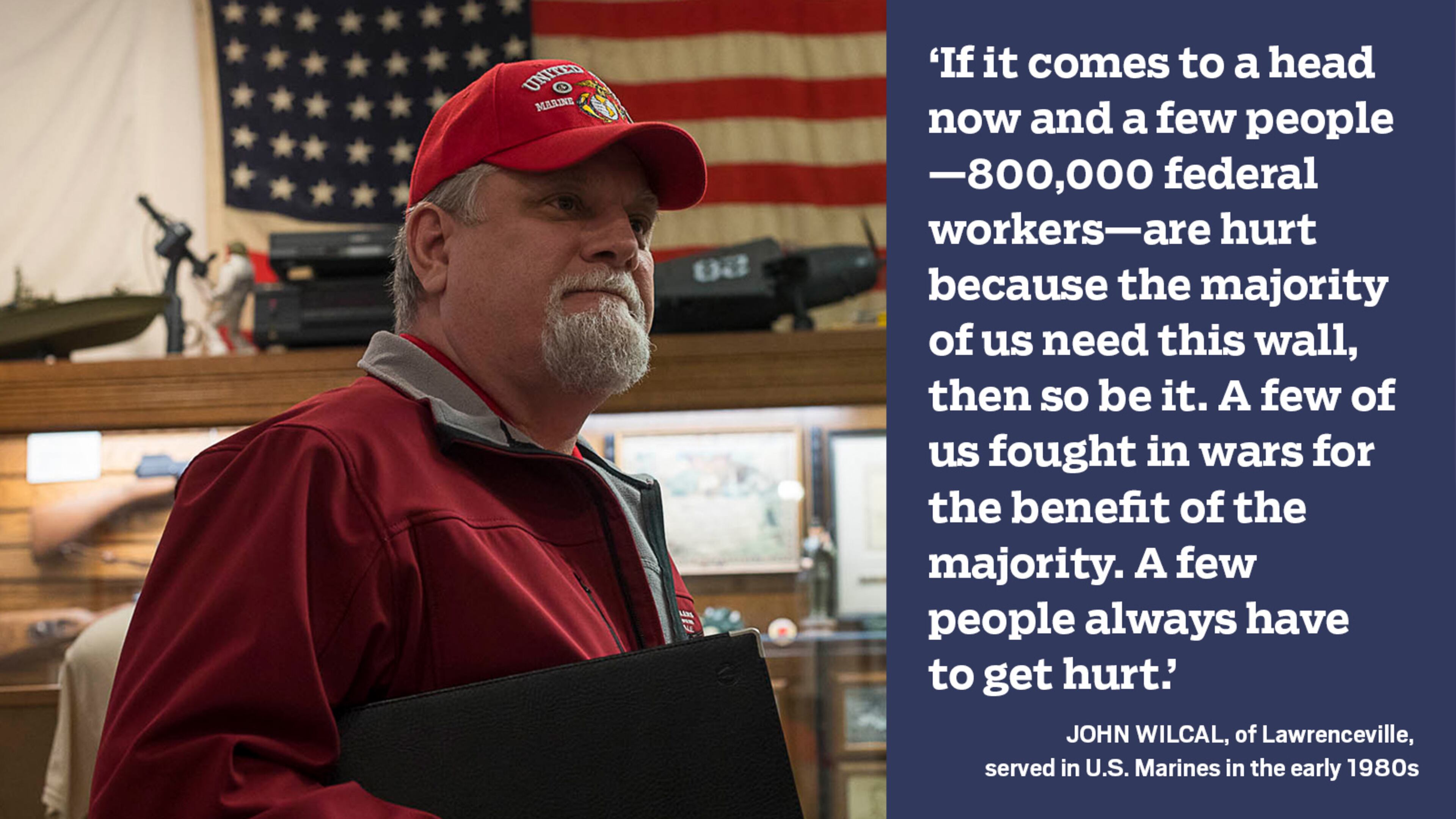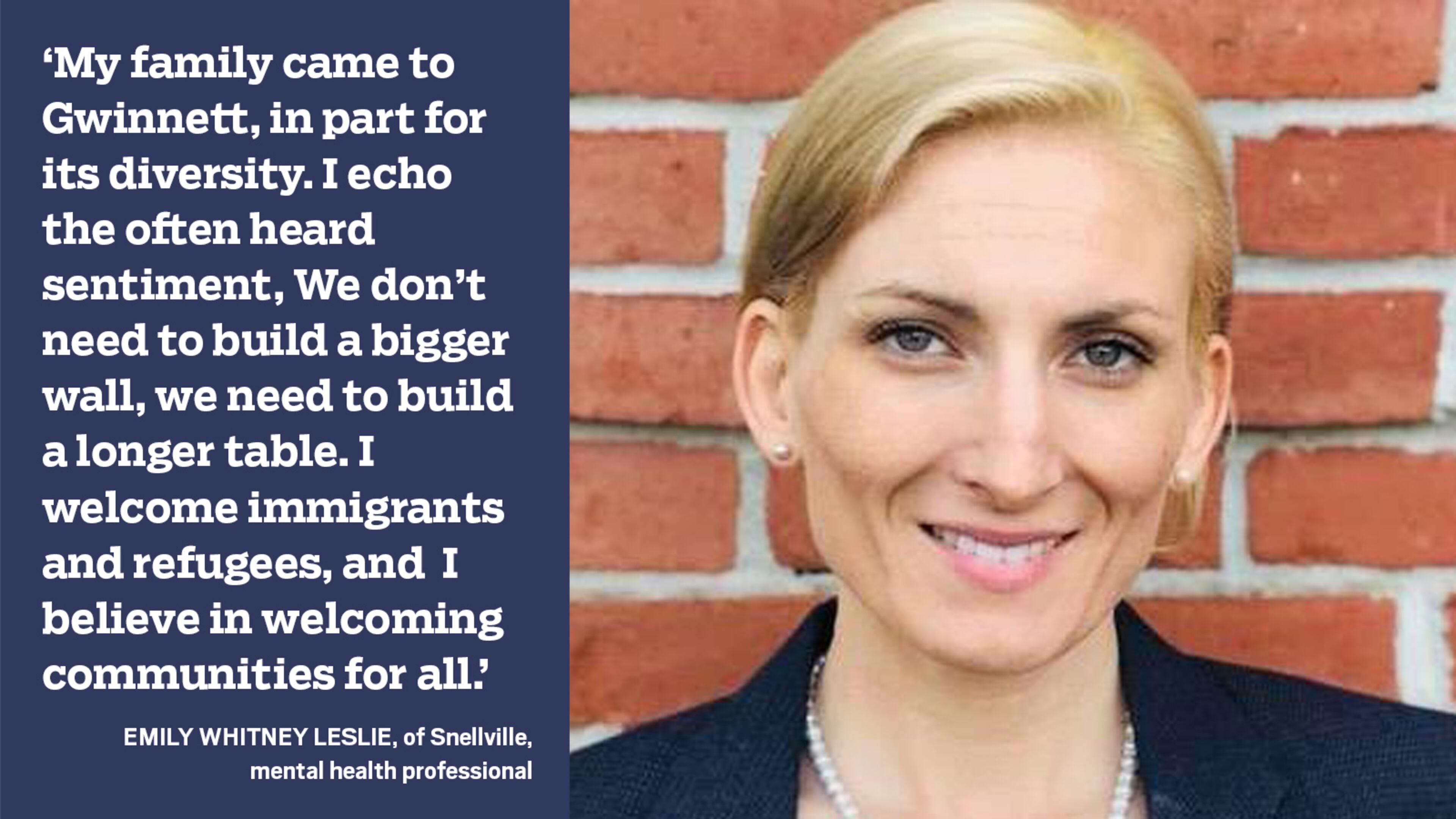In rapidly changing Gwinnett, views differ on Trump’s wall and shutdown
Gwinnett County residents Ya’Ron Brown and John Wilcal — both military veterans, one black and one white — sit on opposite sides of a philosophical wall as big and thick as the one President Donald Trump wants to build on the southern border.
“The wall is smoke and mirrors,” said Brown, getting his weekly haircut at the Hair King Barbershop in Snellville. “It is not going to be effective in keeping immigrants out. We should be more of an ally to those in need.”
In Lawrenceville, Wilcal was holding court with a handful of white-haired veterans at the Gwinnett Veterans Memorial Museum where they volunteer daily. They believe in the wall — at all costs — and anyone “who doesn’t believe in a wall is foolish and dishonest.”
» RELATED: Trump mentions Georgia killing in border wall speech
» SHUTDOWN: Employers confused by loss of background check
“If you been asking for a wall and the government has been ignoring you, something has to be done,” said Wilcal of Trump’s demand for taxpayers to dole out at least $5.7 billion to fund more wall on the Mexican border. The federal government has been partially shuttered since Dec. 22, after Democrats refused to fund the proposal.

“If it comes to a head now and a few people — federal workers — are hurt because the majority of us need this wall, then so be it,” Wilcal said. “A few of us fought in wars for benefit of the majority. A few people always have to get hurt.”
If you want to gauge which way Atlanta is leaning on Trump's proposed wall and the subsequent shutdown, Gwinnett is a good place to start. The sprawling community in the northern suburbs has experienced dramatic change over the past 25 years amid an influx of blacks, Asians and Hispanics, including undocumented immigrants. The county's politics also have moved from red to purple to slightly blue, positioning it as a potential swing district in a swing state ahead of the 2020 presidential elections.
The Atlanta Journal-Constitution interviewed more than 15 residents in different Gwinnett neighborhoods after Trump took his case to the American people in a televised address Tuesday. Several who were approached on the street and weren’t interviewed said they weren’t aware of the shutdown and wall controversy.

Among those who shared their opinion, most were against the wall being built or shutting down the government to get it done — not unlike the country at large, where Trump enjoys less than 50 percent support. Several who backed Trump’s strategy didn’t want to give their names, including one man who said his wife was afraid to walk on the street because of Mexicans. Three weeks into the shutdown, whether for or against, most remained entrenched in their views.
As recently as 1990, more than 90 percent of Gwinnett's 350,000 residents were white. As the population swelled, it officially became a majority-minority county in 2010. Today, less than 40 percent of Gwinnett's 920,000 residents are white and just over 20 percent are Latino. By 2040 Latinos could outnumber whites, according to some projections.
Brad Goff, 64, who has lived in Gwinnett for 32 years, says he can see the change and calls opposition to the wall “unconscionable.” Anecdotally, he talks about county clinics being overloaded, of gas stations “swarming” with people looking for work, and of increases in Section 8 housing, free medical services and after-school programs.

“We have beautiful new school facilities, just built within the last few years, and almost everyone has a large number of trailer classrooms in the back,” said Goff. “This is a direct result of the influx of illegals to the county. I do not hate or resent any particular race, class or origin, but I can clearly see that there are limits to everything and our county has greatly exceeded the limit of immigrants it can bear.”
Emily Whitney Leslie, a 35-year-old mental health professional, sees it very differently — also disputing Trump’s characterization in recent days that illegal immigration represents a “humanitarian” crisis.
“This president is the humanitarian crisis,” said Leslie, from the Snellville-Lilburn area, adding her family came to Gwinnett in part for its diversity. “He is using the most potent drug to try and gain support for this wall. Fear.”

Most — but not everyone — saw the issue in black-and-white terms. Frank McKnight positioned his truck in front of a friend’s consignment shop in Lawrenceville to pick up a jewel cabinet for his place, Frank’s Consignment Brotique. The friend, who emigrated from Iran, said talking would get him in trouble. McKnight had no such concerns and argued that legal immigration, which brings in highly skilled workers, is a bigger threat to American jobs. McKnight supports the wall, but with a caveat.
“Securing the borders sounds good, but we need fair laws. We need to get a handle on legal immigration,” McKnight said. “And the shutdown is blackmail in my opinion. But both sides are to blame.”
The Gwinnett County Sheriff's Office is one of seven Georgia agencies that participate in the controversial 287(g) program, a federal program that gives state and local authorities some of the same powers as immigration authorities. More than 2,100 people were held on citizenship questions at the county jail in 2017, the most since 2012, when the number topped 3,000.

That has created some tension in local law-enforcement efforts amid a reported rise in crimes against Hispanics. Last August, the Gwinnett County Police Department issued a press release urging Hispanics to feel safe reporting crimes regardless of their immigration status.
At a packed Mexican restaurant in downtown Lawrenceville on Wednesday, a team of police officers sat around a large table eating lunch. As black and white customers streamed in, the Hispanic manager of the restaurant respectfully declined to speak about the wall.
Gwinnett is no stranger to racial or ethnic tensions. A few days before Trump was inaugurated, county commissioner Tommy Hunter created national headlines when he described civil rights icon and U.S. Rep. John Lewis as "a racist pig" on Facebook amid a public feud between Lewis and Trump.
Hunter has since been joined on the commission dais by Ben Ku and Marlene Fosque — Gwinnett's first Asian- and African-American commissioners, respectively. This month, Ramon Alvarado was sworn in as the county's first Hispanic judge.
Those changes came after Hillary Clinton topped Trump in Gwinnett in the 2016 election, becoming the first Democratic presidential candidate to win the county since Jimmy Carter in 1976.
But even as the county's delegation to the state Legislature flipped to a Democratic majority in last November's elections, U.S. Republican Congressman Rob Woodall, whose district includes much of Gwinnett, was narrowly re-elected and remains a staunch supporter of Trump's border security policies.
“I don’t believe the county has done nearly enough of what it needs to do to embrace the changing diversity,” said Jerry Gonzalez, executive director of the Georgia Association of Latino Elected Officials, a statewide nonprofit aiming to increase Hispanic civic engagement.

At a Lawrenceville coffee shop fashioned out of a huge white post-bellum home, Ricky Robinson found a quiet corner of a quiet room to do some work for his tech company. The 37-year-old Dacula resident had one window of his computer open to the news, shaking his head over the shutdown.
“This really lets you know where Trump’s mindset is. He can’t relate to common folks,” Robinson said. “How hard are people going to work when they are not getting paid? He is putting our country at risk and this shutdown should really be a wake-up call to all of us.”
Back at Hair King Barbershop, the shop’s owner, David Washington, moderated the day’s debate. Washington said he was in favor of the wall, siding with a soldier. But Washington’s support was wavering as he trimmed the beard of Brown, the veteran opposed to the wall.
Brown is a government contractor who owns a small café in a federal building. So, no government, no kitchen. He said he had lost thousands of dollars and that the livelihoods of at least five of his workers are up in the air, while his cook had already gotten another job. Unlike actual government workers, who could get reimbursed for lost wages, Brown and his team will not.
“It has been very impactful for my family. But I am more concerned about my employees because they have families too,” said Brown. “This would be different if everybody had skin in the game. The president and the politicians are not suffering like the American people are.”



